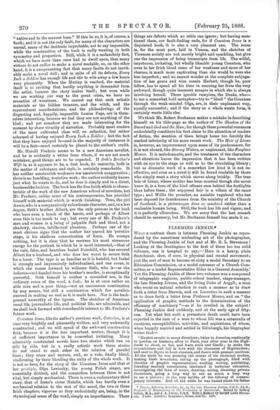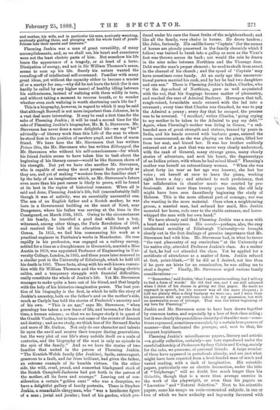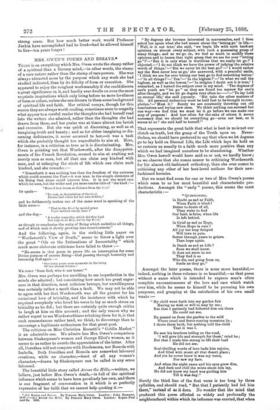FLEEll/ING JENKIN.*
WHAT a contrast there is between Fleeming Jenkin as repro- duced by the sometimes misleading art of the photographer, and the Fleeming Jenkin of fact and of Mr. R. L. Stevenson !
Looking at the frontispiece to the first of these too too solid volumes, one is tempted to say,—' Here is a heavy, plain Scotchman, slow, if sure, in physical and mental movement; just the sort of man to become at sixty a model Secretary to an Education Commission, or a model convener of a Church Com- mittee, or a model Representative Elder in a General Assembly.' Yet the Fleeming Jenkin of these two volumes was a compound of telegraphic engineer, public-school teacher, stage-manager, the late Stanley Jevons, and the living Duke of Argyll; a man who wrote on natural selection in such a manner as to draw forth a letter from Darwin, and on Lucretius in such a manner as to draw forth a letter from Professor Monro, and on "the application of graphic methods to the determination of the efficiency of machinery "—as if he revelled in the subject ! Fleeming Jenkin died suddenly, and at the early age of fifty- one. Yet what but such a premature death could have been expected in the ease of a man to whom life was a saturnalia of
emotions, susceptibilities, activities, and aspirations, of whom, when happily married and settled in Edinburgh, his biographer writes that— "He shot erratic in many directions ; twice to America, continually to London on business, often to Paris, year after year to the High- lands to shoot, to fish, and learn reels and Gaelic ; to make the acquaintance and fall in love with the character of Highlanders; and over to Styria to hunt chamois, and dance with peasant maidens. All the while he was pressing the course of his electrical studies, making fresh inventions, taking up the phonograph, filled with theories of graphic representation, reading, writing, publishing, founding sanitary associations, interested in technical education, investigating the laws of metre, drawing, acting, directing private theatricals, going a long way to see an actor, a long way to see a picture ; in the very bubble of the tideway of contem- porary interests. And all the while he was busied about his father • Papers, Literary, Scientific, &c., by the late Fleeming Jenkin, LL.D., Professor kr Engineering in the University of Edinburgh. Edited by Sydney Colvin, M.A., and J. A. Swing, PALS. With a Memoir by Robert LOUIS Steven- son. 2 vols. London: Longmane, Green, and Co. 1887.
and mother, his wife, and in particular his sons, anxiously watching, anxiously guiding these, and plunging with his whole fund of youth- fulness into their sports and interests."
Fleeming Jenkin was a man of great versatility, of many accomplishments, and, as we shall see, his heart and conscience were not the least electric parts of him: But somehow his life bears the appearance of a tragedy, or at least of a torso. Dissipation of energy, and not in Sir William Thomson's sense, seems to sum up his life. Surely his nature wanted the rounding-off of intellectual self-command. Familiar with many great ideas, yet without the capacity either to become a master of or a martyr for one,—why did he not learn the trick (for it can hardly be called by any higher name) of healthy idling between his enthusiasms, instead of waltzing with them wildly in turn, and without taking a moment to recover breath, or to wonder whether even such waltzing is worth shortening one's life for ?
This is a biography, however, in regard to which it may be said that although Boswell is not more important than Johnson, he is a vast deal more interesting. It may be read a first time for the sake of Fleeming Jenkin ; it will be read a second time for the sake of Fleeming Jenkin's biographer, Mr. B. L. Stevenson. Mr. Stevenson has never done a more delightful bit—we say "bit" advisedly—of literary work than this Life of the man to whom he stood first in the position of careless pupil, and then of warm friend. We have here the Mr. Stevenson that has written Prince Otto, the Mr. Stevenson who has written Kidnapped, the Mr. Stevenson who without his self-consciousness—for which his friend Jenkin seems to have taken him to task about the beginning of his literary career—would be like Samson shorn of his strength. But yet we have also another Mr. Stevenson, who is capable of seeing the most prosaic facts precisely as they are, and yet of making "wonders from the familiar start" by the help of an imagination which, as Mr. Stevenson's future even more than his past career is likely to prove, will be found at its best in the region of historical romance. When all is said and done, Fleeming Jenkin's life, fall (uncomfortably full) though it was of activity, was an essentially uneventful one. The son of an English father and a Scotch mother, he was born in a Government building on the coast of Kent, near Dungeness, where his father was serving at the time in the Coastguard, on March 25th, 1833. Owing to the circumstances of his family, he travelled a good deal while but a boy, witnessed, among other things, the Paris Revolution of 1848, and received the bulk of his education at Edinburgh and Genoa. In 1851, we find him commencing his work as a practical engineer in Fairbairn's works in Manchester. He rose rapidly in his profession, was engaged on a railway survey, settled for a time as a draughtsman in Greenwich, married a Miss Austin in 1859, was appointed Professor of Engineering in Uni- versity College, London, in 1865, and three years later removed to a similar post in the University of Edinburgh, which be held till his death in 1885. These facts, along with his well-known connec- tion with Sir William Thomson and the work of laying electric cables, and a temporary struggle with financial difficulties, really constitute the whole of Jenkin's life. Yet Mr. Stevenson manages to make quite a hero out of his friend, and that largely with the help of his his torico-imaginative power. The best por- tion of his biography is the first, in which he tells the story of Jenkin's ancestry, both on the father's and on the mother's side, much as Carlyle has told the stories of Frederick's ancestry and of his own. "This is an age," says Mr. Stevenson, "when genealogy has taken a new lease of life, and become, for the first time, a human science ; so that we no longer study it in quest of the Guaith Voeths, but to trace out some of the secrets of descent and destiny ; and as we study, we think less of Sir Bernard Burke and more of Mr. Galton. Not only do our character and talents lie upon the anvil and receive their temper during generations, but the very plot of our life's story unfolds itself on a scale of centuries, and the biography of the man is only an episode in the epic of the family." And so we have the stories of two families that united in the person of Fleeming Jenkin. "The Kentish-Welsh family (the Jenkins), facile, extravagant, generous to a fault, and far from brilliant, had given the father, an extreme example of its humble virtues. On the other side, the wild, cruel, proud, and somewhat blackguard stock of the Scotch Campbell-Jacksons had put forth in the person of the mother, all its force and courage." Leaving out of con- sideration a certain "golden aunt" who was a deception, we have a delightful gallery of family portraits. There is Stephen Jenkin, a remarkable clergyman, who "wee a handsome figure of a man ; jovial and .jocular; fond of his garden, which pro-
duced under his care the finest fruits of the neighbourhood; and like all the family, very choice in horses. He drove tandem ; like Jehu, furiously. His saddle-horse ' Captain ' (for the names of horses are piously preserved in the family chronicle which I follow) was trained to break into a gallop as soon as the Vicar's foot was thrown across its back; nor would the rein be drawn in the nine miles between Northiam and the Vicarage door.
Debt was the man's proper element ; he used to skulk from arrest in the chancel of his church ; and the speed of 'Captain' may have sometimes come bandy. At an early age this unconven- tional parson married his cook, and by her he had two daughters and one son." There is Fleeming Jenkin's father, Charles, who "at the day-school of Northiam, grew so well acquainted with the rod, that his floggings became matter of pleasantry, and reached the ears of Admiral Bnckner. Hereupon that tall, rough-voiced, formidable uncle entered with the lad into a covenant ; every time that Charles was thrashed, he was to pay the Admiral a penny ; every day that he escaped, the process was to be reversed. I recollect,' writes Charles, going crying to my mother to be taken to the Admiral to pay my debt." Again, when Fleeming's mother was living in Genoa, "a red- bearded man of great strength and stature, tanned by years in India, and his hands covered with barbaric gems, entered the room unannounced, as she was playing on the piano, lifted her from her seat, and kissed her. It was her brother suddenly returned out of a past that was never very clearly understood, with the rank of General, many strange gems, many cloudy stories of adventure, and next his heart, the dagnerrotype of an Indian prince, with whom he had mixed blood." Fleeming's mother was herself an extraordinary woman. "When she was about forty (as near as her age was known), she lost her voice ; set herself at once to learn the piano, working eight hours a day ; and attained to such proficiency, that her collaboration in chamber music was courted by pro- fessionals. And more than twenty years later, the old lady might have been seen dauntlessly beginning the study of Hebrew. This is the more ethereal part of courage ; nor was she wanting in the more material. Once when a neighbouring groom, a married man, had seduced her maid, Mrs. Jenkin mounted her horse, rode over to the stable entrance, and horse- whipped the man with her own hand."
We have already said that Fleeming Jenkin was a man with a heart and a conscience. His morale—perhaps, also, the easy
intellectual morality of Edinburgh University—is brought clearly out in the first dealings of genuine importance that Mr.
Stevenson had with him. Mr. Stevenson had, in what he terms "the vast pleasantry of my curriculum" at the University of
his native city, attended Professor Jenkin's class. As a matter of fact, he had not attended the class. Yet he applied for a certificate of attendance as a matter of form. Jenkin refused at first, point-blank,—" If he did as I desired, not less than if he gave me hints for an examination, he was aiding me to
steal a degree." Finally, Mr. Stevenson urged various family considerations :—
" 'Remember,' said Jenkin, 'that I can promise nothing, but I will try to find a form of words.' He did find one, and I am still ashamed when I think of his shame in giving me that paper. He made no reproach in speech, bat his manner was all the more eloquent ; it told me plainly what a dirty business we were on ; and I went from his presence with my certificate indeed in my possession, but with no answerable sense of triumph. That was the bitter beginning of my love for Fleeming'" Jenkin and Mr. Stevenson seem to have been drawn together by.common tastes, and especially by a love of first-class acting ;
but it was clearly the punctilious sincerity of the elder man—some- times expressed, sometimes concealed, by a certain brusqueness of manner—that fascinated the younger, and, next to that, his buoyant boyishness.
Fleeming Jenkin's miscellaneous papers, literary and artistic
—a goodly collection, certainly—are here reproduced under the careful editorship of Professors Sydney Colvin and Ewing, mainly for the sake, we presume, of personal friends. A large number of them have appeared in periodicals already, and are just what might have been expected from a level-headed man of much and varied reading, with a dash of imagination. His scientifio papers, particularly one on electric locomotion, under the title of " Telphemge," will no doubt live much longer than his Griselda, though that is a more than average exercise in the work of the playwright, or even than his papers on " Lucretius " and "Natural Selection." Next to his scientific papers, come his mays on eocio-economical enbjecte, in one or two of which we have audacity and ingenuity flavoured with
strong sense. But how much better work would Professor Jenkin have accomplished had he lived—had he allowed himself to live—ten years longer !








































 Previous page
Previous page